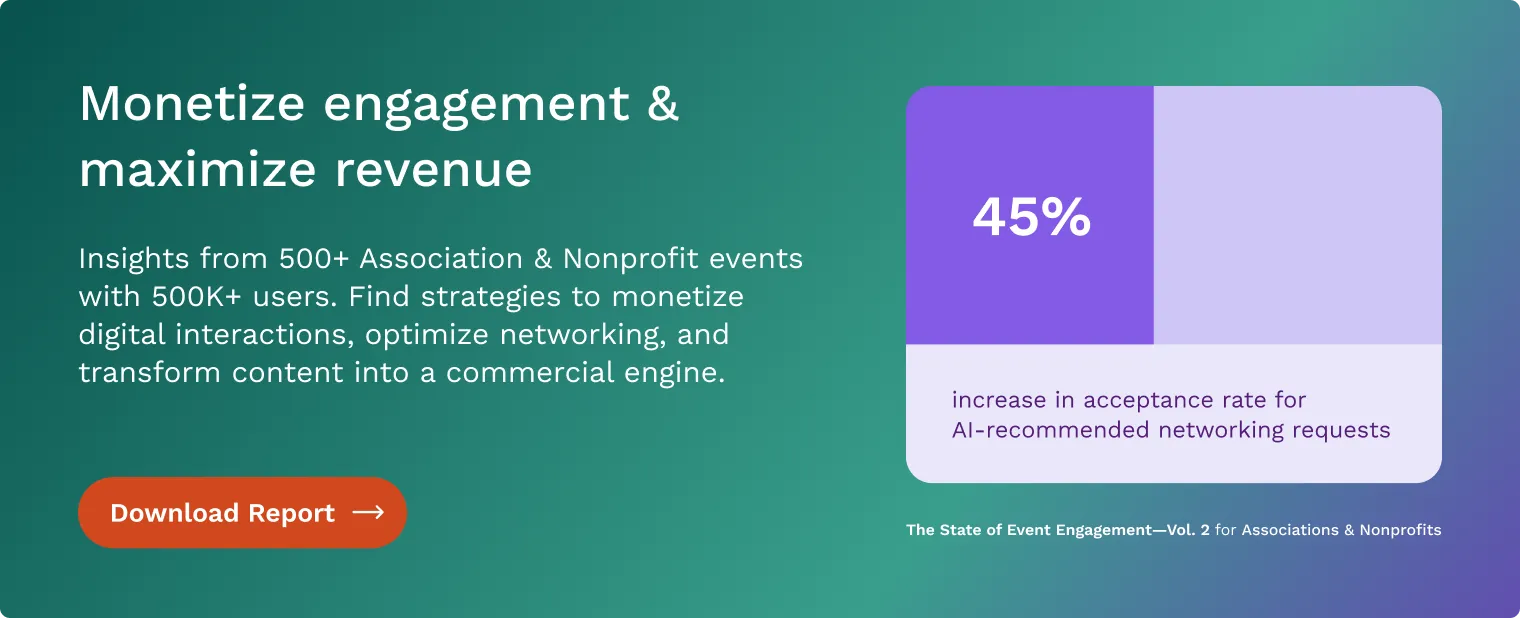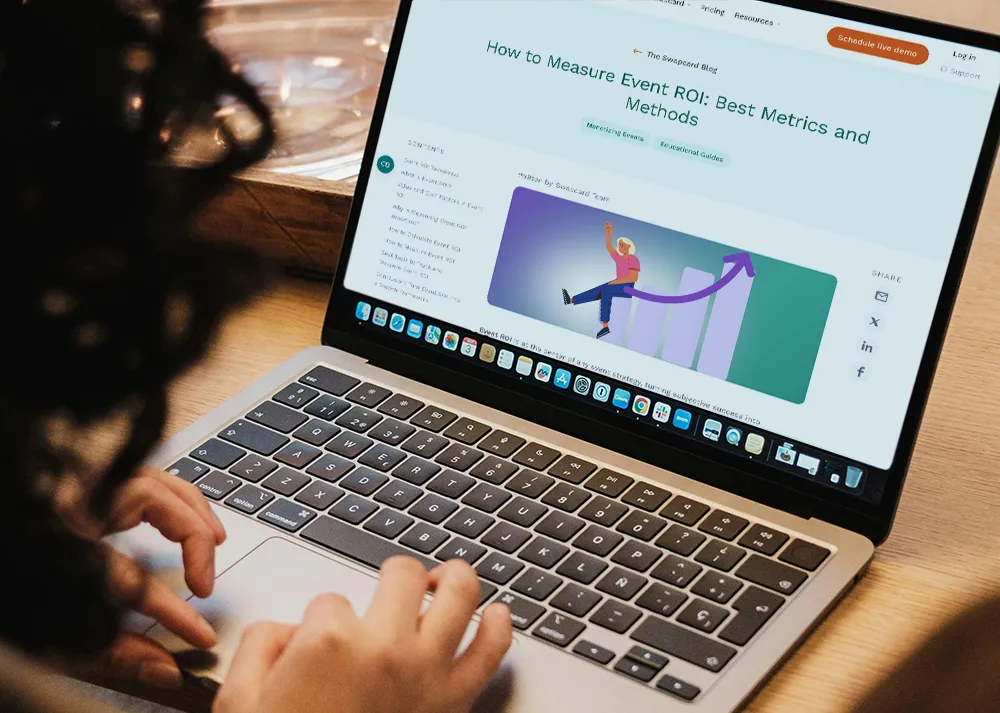Event management is a cornerstone of any organizer’s responsibilities. As the structured planning and execution of all types of events, it is a complex task that involves many steps and skills: planning, logistics, attendee management, marketing, reporting, and more. If you want to successfully run an event and ensure satisfaction from both exhibitors and attendees, you need the right knowledge and meticulous coordination.
.webp)
This guide provides everything you need to know about event organization and management, the tools to use, and all the steps required to not only run successful events but also create a memorable experience for all participants.
- Event Management Takeaways
- What Is Event Management?
- Why Is Event Organization and Management Important?
- What Are Event Management Skills?
- Which Events Need Managing?
- What Are the 6 Steps of the Event Management Process?
- Streamline Your Events with the Right Tools
- Conclusion: Event Management Makes or Breaks Your Event
- FAQs

Event Management Takeaways
- Event management is organizing and executing every part of an event
- It applies to all types of events: conferences, trade shows, fundraisers, etc.
- There are six main steps to manage an event: objective definition, planning and budgeting, venue selection, marketing, on-site management, and post-event follow-up
- Use event management software like Swapcard to streamline your events
What Is Event Management?
Event management is the process of designing and executing all types of events—conferences, trade shows, etc.—from beginning to end. It covers logistics, budgeting, marketing, vendor coordination, and on-site supervision to ensure everything runs smoothly. The goal of event management is to create a successful, engaging experience that meets the organizer’s objectives and satisfies attendees.

What Is the Difference Between Event Management and Event Planning?
Event planning is a component of event management. It focuses on the pre-event process, including defining event goals, budgeting, and coordinating logistics. Event management is the global process, involving overseeing the event’s execution, handling operations, vendors, and on-site issues.
Although both terms are used interchangeably and often overlap, they are two distinct phasesEvent planning is about putting the event together before it happens, while event management is about executing the event. Nevertheless, both roles are essential for a successful experience.
Why Is Event Organization and Management Important?
Event organization and management is important because it ensures events are strategically planned and efficiently executed. It focuses not only on achieving the event’s objectives but also on delivering a valuable and memorable experience for attendees. If an event is successful, no matter its type, it is because every step of the event management process was perfectly executed.
Poorly managed events can lead to disappointed attendees and a weakened brand reputation, while well-organized events can amplify impact, reduce risks, strengthen brand perception, generate buzz, and ultimately deliver strong ROI for organizers, exhibitors, and participants alike.

What Are Event Management Skills?
Event managers require a blend of technical and interpersonal skills to ensure the efficient organization and execution of an event:
- Planning and organization: Creating and running an event requires coordinating many moving parts—big and small. Event managers and event planners must know how to multitask, manage time effectively, coordinate all involved stakeholders, be meticulous, and keep the project on track within the planned schedule.
- Creativity: Creativity transforms event goals into personalized attendee experiences that inspire and drive engagement.
- Technological skills: Today’s event professionals must master tools that simplify registration, engagement, check-ins, badge generation, data analytics, marketing automation, and post-event surveys.
- Budget management: From estimating costs and allocating funds to knowing when to pivot in order to stay within budget and ensure profitability.
- Communication: Managing an event involves engaging with many people—stakeholders, vendors, venue staff, exhibitors, attendees, sponsors, and more. Communicating effectively with individuals who have different roles and goals, and knowing how to build strong relationships and negotiate effectively, is essential to achieving the desired outcome.
- Risk management and problem-solving: Unexpected challenges require a clear contingency plan, fast decision-making, and adaptability without compromising attendee satisfaction.
Having these skills and knowing how to use them is essential to ensure every piece of the event puzzle fits perfectly.
Which Events Need Managing?
Every professional event requires strategic management: big or small, local or international, public or private, social or corporate, in-person or virtual. This includes:
- Conferences
- Conventions
- Trade shows
- Exhibitions
- Meetings
- Fundraisers
- Team buildings
- Training seminars
Each event type has distinct needs, but the goals are consistent: meaningful engagement, strong ROI, and a seamless experience for attendees and exhibitors.

What Are the 6 Steps of the Event Management Process?
Successful event management follows a structured process. Here are the six essential steps to deliver impact at every stage of the event lifecycle:
- Defining objectives and scope
- Planning and budgeting
- Venue and supplier coordination
- Event marketing and promotion
- Event execution and on-site management
- Post-event follow-up
1. Defining Objectives and Scope
The first step in event management is to identify the purpose of the event, its objectives, and its target audience:
- What is the goal of the event? To increase brand visibility, to launch a product, to raise funds, to educate?
- Who is this event for? B2B, B2C, stakeholders, employees, doctors, artists?
It also requires defining the scope of the event:
- How many attendees are we expecting?
- What is the budget range?
- When does it need to happen?
- Where does it need to happen?
Defining clear objectives and scope will help determine the strategy, as well as influence and structure the event management process: format (in-person, virtual, hybrid), tone, venue, marketing, sponsors, speakers, etc. At this stage, efficient communication with the organizers is crucial to ensure your strategy is aligned with the objectives and to avoid early challenges.
Once the big picture is set, you can organize your team to handle the various tasks, clearly define every role, and establish a communication plan.
2. Planning and Budgeting
Once the objectives and scope are clear, the next step is to translate them into a concrete management plan, with a timeline and a budget. The goal here is to craft a detailed and well-planned roadmap to ensure you stick to the schedule, avoid overspending, and prepare for unexpected delays or costs. This step includes task allocation, resource planning, cost forecasting, contingency planning, and expense tracking.
This plan must consider all possible costs, notably:
- Venue
- Tech and equipment
- Staff
- Guests
- Catering
- Lodging
- Transportation
- Marketing
- Printing
While also knowing where the money will come from: sponsors, partners, ticket sales, etc. For instance, for a B2B conference for a consulting firm, the timeline of the event organization must be detailed in advance (e.g. 3 months before: confirm venue, speakers, and sponsors), and the budget must be set and allocated (e.g. if the budget is €35,000, €8,000 may be allocated to the venue, €5,000 to the speakers, €2,000 to the marketing, etc.).
3. Venue and Supplier Coordination
Venue selection is one of the most impactful decisions in the event management process. It affects logistics, budget, and guest experience. The venue choice depends on the type and scale of the event, as well as the experience you want to offer. To make sure you choose the right venue, ask yourself the following questions:
- What kind of venue suits the event and its goals? (Hotel, convention center, art gallery, stadium, museum, etc.)
- Is the venue available on the desired date?
- Is the venue accessible and convenient for the target audience?
- Can it host the expected number of attendees?
- Does it have the equipment and technology required for the event?
Once the venue is secured, you’ll need to do an on-site check of the facilities, the staff, and the equipment. Maintain open communication with the venue managers throughout the planning process up until the event ends.
You’ll also need to coordinate with suppliers—caterers, decorators, AV technicians, security, and speakers—to align timing, costs, expectations, etc. Create a run sheet with all event details: logistics, contact information, and contingency plans to avoid miscommunication, delays, or long-term issues.

4. Event Marketing and Promotion
Once the venue and the suppliers are locked down, you need to start promoting your event. Effective promotion ensures your event reaches the right audience, builds excitement, and drives engagement. Your event marketing strategy should align with the goals and target audience defined earlier.
To promote your event, leverage several traditional and digital marketing channels:
- Event website: This is where future attendees can check out the program, the speakers, the sponsors, and practical information (event date, venue, access, etc.). Ensure the website is connected to your event registration software for seamless attendee registration.
- Social media: Use platforms such as Facebook, Instagram, and LinkedIn to build excitement and engage with potential attendees.
- Emails and SMS: Craft targeted campaigns for partners, previous attendees, or exhibitors. You can send invitations, newsletters about the event and its agenda, early discounts, and more.
- Press: Contact the physical and digital press for an article or banner promoting the event. You can also contact blogs or influencers in your sector to create content (text, visual, or audio) around the event.
Plan your communications timeline: teaser posts, countdowns, reminders, and last-minute updates. Consistent, targeted communication helps build anticipation, drive registrations, and reduce no-show rates. For your promotion to reach its targeted audience, you need to make sure the content and the brand voice and strategy are consistent across all channels. Furthermore, ensure your event marketing strategy can be tracked to follow engagement, registration, etc.
For instance, LinkedIn Ads, targeted email campaigns, and partnerships with industry publications might be ideal for a B2B seminar. Instagram Reels, local posters, influencer outreach, and early-bird ticket discounts could work better for a music festival.
5. Event Execution and On-site Management
It’s the day of the event. Meticulous oversight and flawless execution are key. Every step you took so far leads to this moment. Pressure may rise, but things should run according to the plan and the schedule, and any issues must be handled swiftly.
Before the event opens, set up early to allow time for testing AV, installing signage and decoration, placing name tags, and welcoming suppliers. Assign staff to key roles: registration desk, transportation, speaker support, health and safety, technical monitoring, and guest relations.
Check your risk management plan to prepare for any hiccups that arise and quickly address them. Use a run-of-show document detailing the timing of each session, speaker cues, and break transitions. Have a printed version and a message group or walkie-talkies for real-time updates.
The goal of event execution is to ensure everything looks effortless for the vendors, the exhibitors, and the attendees—even if you're solving problems behind the scenes.
6. Post-Event Follow-Up
The event may be over, but your work is not. Now comes post-event management, when you use the data gathered to measure success, connect with leads, and receive feedback. Once attendees have left and vendors have cleared the venue, it’s time to
- Send a thank-you email within 24 to 48 hours to attendees, speakers, and partners.
- Include a feedback survey or engagement score to gather insights, assess satisfaction, and identify areas for improvement.
- Analyze key metrics based on your original objectives to measure ROI: number of attendees vs. registrants, engagement during sessions, social media performance, satisfaction ratings, leads captured, or sales generated.
- Conduct an internal debrief with your team to document insights, lessons learned, and improvements for the future.
All these final steps—and the data they generate—help measure the success of your event, and guide future improvements for an even better experience.

Streamline Your Events with the Right Tools
Event management requires careful planning and a lot of multitasking to balance all the various aspects and parties involved, ensuring smooth execution. Use event management software to streamline your event management process, better handle all digital aspects, save time on repetitive tasks, and focus on high-impact activities.
Event management technology, such as Swapcard, our event engagement platform, is the go-to solution for event professionals, supporting each stage of the process and leading to more successful, profitable events:
- Centralize and automate time-consuming tasks like emailing and schedule updates
- Improve communication with vendors, staff, exhibitors, and partners
- Simplified event registration and ticketing
- Offer on-site check-in and badging, replacing manual processes
- Boost attendee engagement by connecting them to key content and resources
- Enhance attendee networking, making meetings and appointments quick and easy
- Access real-time analytics and reporting to measure attendance, engagement, and ROI
- Deploy detailed feedback forms and conduct attendee surveys quickly and easily
With Swapcard, enhance attendee engagement, maximize exhibitor ROI, and drive revenue growth through AI-powered features and a seamless mobile experience. With our mobile app for events, your attendees can access schedules, connect with others, and explore the event—all from one app.
Conclusion: Event Management Makes or Breaks Your Event
Event management is not just about planning or logistics; it’s about bringing a vision to life and delivering a well-executed project that meets the objectives, provides new opportunities, creates and strengthens relationships, and offers a memorable experience for participants.
Looking to plan an event? Get in touch with our team to discuss how Swapcard can achieve the best event outcomes and turn engagement into revenue, and schedule a live demo!
FAQs
What Is the Main Purpose of Event Management?
The main purpose of event management is to plan and organize all aspects of an event, from its conception to execution, to ensure a successful experience for all participants. It encompasses many important processes: event definition, budgeting, sponsoring, venue selection, marketing, attendee engagement, on-site management, and evaluation.
Why Use Event Management Software?
Event management software helps event organizers streamline the entire event management process: registrations, budgeting, communication, check-in, engagement, networking, monetization, lead capture, performance tracking, etc. An event management platform integrates all the various tasks into one interface, allowing professionals to save time and money and deliver a better experience for all parties.
How Do You Ensure the Success of an Event?
A successful event depends on several aspects: clear and achievable objectives, strategic planning, clear communication, precise execution, and post-evaluation. It also requires meticulous care for all parties involved—exhibitors, vendors, attendees, sponsors, etc.—to ensure everyone has an unforgettable experience.
Join 12,000 subscribers and unlock industry secrets.
By submitting this form, you agree to receive periodic emails on insightful content related to events and our product, and in accordance with our Privacy Policy. You can, of course, change your preferences or unsubscribe at any time.







.svg)


.svg)
.svg)
.svg)





